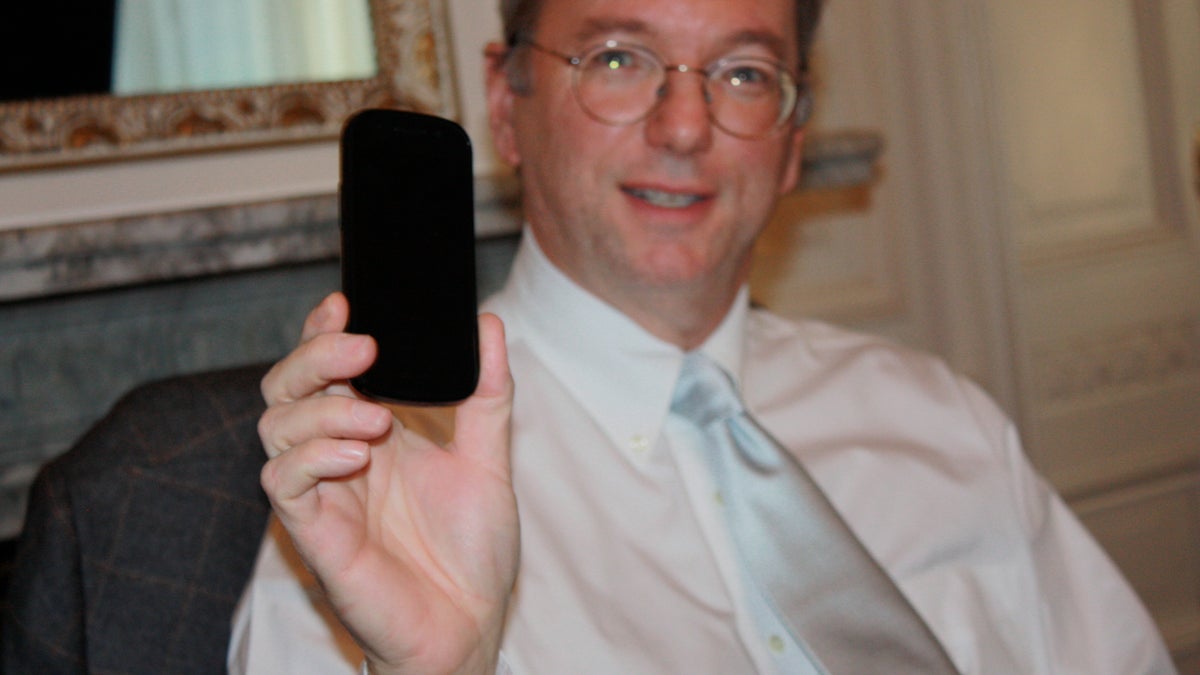Google's Schmidt teases new Android phone
No specific details were released, but CEO Eric Schmidt held up an unannounced Android phone during his Web 2.0 Summit talk that uses a new wireless chip.

SAN FRANCISCO--Google plans to support Android phones with near-field communications chips in the next version of Android, which CEO Eric Schmidt said today would arrive in the next few weeks.
Schmidt, kicking off the Web 2.0 Summit at the Palace Hotel here in downtown San Francisco, held up an "unannounced product" that appeared to be the Nexus S, which leaked out on Best Buy's Web site last week. The phone--Google unhelpfully covered over the brand label--was running Android 2.3, code-named Gingerbread and used a near-field communications chip that Schmidt thinks could eventually replace credit cards.
Near-field communications chips allow for fast short-range wireless transmissions, and credit card companies believe that those transmissions are actually more secure than the mag-stripe technology on your current credit cards, Schmidt said in a discussion with reporters following his discussion with Web 2.0 Summit hosts Tim O'Reilly and John Battelle. Credit cards aren't going away for quite some time, but Google is interested in getting the technology out in front of developers in order to see what happens, he said.
Schmidt touched on several topics during his talk and in the briefing afterward.
• Android: Google is pretty satisfied with how Android has worked out, but Schmidt said if he had to nitpick one thing it would be how Google chose to focus on developing Android itself over emphasizing third-party application development. He bemoaned how people focus on the competitive battle between Google and Apple in smartphones while missing the point that the entire market is growing like crazy.
• Raises: Schmidt confirmed that Google gave employees the option of taking home last week's bonuses in actual cash, but declined to say how much money the company had sitting around last Tuesday night. A Google engineer stepped forward over the weekend to claim that the person who was fired for leaking the memo about the $1,000 bonuses put employees in danger.
• Privacy: Google is under a ton of scrutiny from privacy advocates this year following its embarrassing Street View Wi-Fi scandal, and Schmidt reiterated that Google takes its responsibilities seriously, noting that even though the technology is available to permit real-time face-recognition in products like Google Goggles, the company has made a conscious decision to hold back.
What "we learned with all of these things is you just can't rush a product out any more. An engineer's political views is not (necessarily) what governments would accept," Schmidt said. "What we have learned is that people disagree on where that line is, and it is not up to Google to make that decision."
• Social: Schmidt didn't have much to say about social technologies, which has long been a weak spot for Google. He expressed the potential for social cues to continue to enhance search results.
"We agree that social information's very important, in particular the name value graphs that they generate," he said. "We can produce a better search result with your permission. Information that is anonymous about what your friends are doing is made available as one of the many signals we provide."
• Facebook: Likewise, he also declined to say anything about the fact that Facebook's revamped messaging system, while not an e-mail client, may be intended to sway consumers away from more traditional e-mail like Gmail (but which, on the flip side, exhibits many of the real-time messaging vibes of the failed Google Wave). "It would not be appropriate for me to comment on their product. I am the CEO of Google, not Facebook," he said.
Though he had insisted it was not in specific reference to an incident last week in which Google stopped permitting Facebook users from importing Gmail contacts--a sign that some saw as an early shot fired in the two companies' supposed forthcoming showdown over e-mail and other messaging--he said, "In general, we've taken the position that user data is the user's, and that it should be possible for them to move it back and forth."
• Chrome OS: Netbooks running the Chrome OS operating system are expected to arrive any week. Schmidt painted the difference between Google's two mobile operating systems in terms of the input methods used with those devices.
"Android is optimized for things that involve touch, (while) Chrome OS is focused on keyboard-based solutions. That's how the market is evolving."
CNET's Caroline McCarthy contributed to this report.